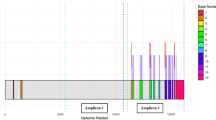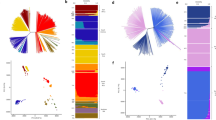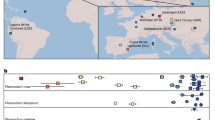Abstract
Glucose-6-phosphate dehydrogenase (G6PD) deficiency is the most common enzymopathy in humans. The prevalence of G6PD deficiency and its molecular basis were studied in Phuket islanders, Southern Thailand. A total of 345 volunteers (123 males and 222 females) were recruited in this study. Infection with Plasmodium falciparum or Plasmodium vivax was not detected in any of these subjects by polymerase chain reaction (PCR)-based diagnosis. G6PD-deficient individuals were identified with the WST-8/1-methoxy PMS method. The molecular basis of G6PD deficiency was investigated by PCR-direct sequencing procedures or PCR-restriction enzyme fragment length polymorphism assays. The numbers of individuals showing severe and mild G6PD deficiency were 14 and 21, respectively. A high prevalence of G6PD deficiency was observed in subjects with Moken (15.4%) or Thai (15.5%) ethnic background. G6PD Mahidol (487G>A) (n=14), G6PD Viangchan (871G>A) (n=11), G6PD Gaohe (95A>G) (n=2), G6PD Kaiping (1388G>A) (n=1), and G6PD Kerala-Kalyan (949G>A) (n=1) were identified. The results suggest that several groups of people of the Asian Continent, such as Burmese, Laotian or Cambodian, Thai and Chinese, participated in the establishment of the ethnic identity of the current ethnic groups of Phuket Island.
Similar content being viewed by others
Log in or create a free account to read this content
Gain free access to this article, as well as selected content from this journal and more on nature.com
or
References
Ainoon O, Yu YH, Amir Muhriz AL, Boo NY, Cheong SK, Hamidah NH (2003) Glucose-6-phosphate dehydrogenase (G6PD) variants in Malaysian Malays. Hum Mutat 21:101
Allison AC (1960) Glucose-6-phosphate dehydrogenase deficiency in red blood cells of East Africans. Nature 186:531
Beutler E (1996) G6PD: population genetics and clinical manifestations. Blood Rev 10:45–52
Beutler E, Vulliamy T (2002) Hematologically important mutations: glucose-6-phosphate dehydrogenase. Blood Cells Mol Dis 28:93
Beutler E, Westwood B, Sipe B (1992) A new polymorphic site in the G6PD gene. Hum Genet 89:485–486
Hirono A, Miwa S, Fujii H, Ishida F, Yamada K, Kubota K (1994) Molecular study of eight Japanese cases of glucose-6-phosphate dehydrogenase deficiency by non-radioisotopic single-single conformation polymorphism analysis. Blood 83:3363–3368
Hsia YE, Miyakawa F, Baltazar J, Ching NS, Yuen J, Westwood B, Beutler E (1993) Frequency of glucose-6-phosphate dehydrogenase (G6PD) mutations in Chinese, Filipinos, and Laotians from Hawaii. Hum Genet 92:470–476
Ivanoff J (1997) Moken, Sea-Gypsies of the Andaman Sea, Post-war Chronicles. White Lotus, Thailand
Iwai K, Hirono A, Matsuoka H, Kawamoto F, Horie T, Lin K, Tantular IS, Dachlan YP, Notopuro H, Hidayah NI, Salim AM, Fujii H, Miwa S, Ishii A (2001) Distribution of glucose-6-phosphate dehydrogenase mutations in Southeast Asia. Hum Genet 108:445–449
Laosombat V, Sattayasevana B, Janejindamai W, Viprakasit V, Shirakawa T, Nishiyama K, Matsuo M (2005) Molecular heterogeneity of glucose-6-phosphate dehydrogenase (G6PD) variants in the South of Thailand and identification of a novel variant (G6PD Songklanagarind). Blood Cells Mol Dis 34:191–196
Luzzatto L, Usanga FA, Reddy S (1969) Glucose-6-phosphate dehydrogenase deficient red cells: resistance to infection by malarial parasites. Science 164:839–842
Matsuoka H, Wang J, Hirai M, Arai M, Yoshida S, Kobayashi T, Jalloh A, Lin K, Kawamoto F (2004) Glucose-6-phosphate dehydrogenase (G6PD) mutations in Myanmar: G6PD Mahidol (487G>A) is the most common variant in the Myanmar population. J Hum Genet 49:544–547
Matsuoka H, Nguon C, Kanbe T, Jalloh A, Sato H, Yoshida S, Hirai M, Arai M, Socheat D, Kawamoto F (2005) Glucose-6-phosphate dehydrogenase (G6PD) mutations in Cambodia: G6PD Viangchan (871G>A) is the most common variant in the Cambodian population. J Hum Genet 50:468–472
Nuchprayoon I, Sanpavat S, Nuchprayoon S (2002) Glucose-6-phosphate dehydrogenase (G6PD) mutations in Thailand: G6PD Viangchan (871G>A) is the most common deficiency variant in the Thai population. Hum Mutat 19:185–190
Oppenheim A, Jury CL, Rund D, Vulliamy TJ, Luzzatto L (1993) G6PD Mediterranean accounts for the high prevalence of G6PD deficiency in Kurdish Jews. Hum Genet 91:293–294
Panich V, Na-Nakorn S, Wasi P (1980) G6PD variants in Chinese in Thailand. Southeast Asian J Trop Med Public Health 11:250–255
Porter IH, Boyer SH 4th (1964) Variation of glucose-6-phosphate dehydrogenase in different populations. Lancet 13:1016
Ruwende C, Khoo SC, Snow RW, Yates SN, Kwiatkowski D, Gupta S, Warn P, Allsopp CE, Gilbert SC, Peschu N et al (1995) Natural selection of hemi- and heterozygotes for G6PD deficiency in Africa by resistance to severe malaria. Nature 376:246–249
Snounou G, Pinheiro L, Goncalves A, Fonseca L, Dias F, Brown KN, do Rosario VE (1993) The importance of sensitive detection of malaria parasites in the human and insect hosts in epidemiological studies, as shown by the analysis of field samples from Guinea Bissau. Trans R Soc Trop Med Hyg 87:649–653
Sodeinde O (1992) Glucose-6-phosphate dehydrogenase deficiency. Baillieres Clin Haematol 5:367–382
Sukumar S, Mukherjee MB, Colah RB, Mohanty D (2004) Molecular basis of G6PD deficiency in India. Blood Cells Mol Dis 33:141–145
Tang TK, Huang CS, Huang MJ, Tam KB, Yeh CH, Tang CJ (1992) Diverse point mutations result in glucose-6-phosphate dehydrogenase (G6PD) polymorphism in Taiwan. Blood 79:2135–2140
Tantular I, Kawamoto F (2003) An improved, simple screening method for detection of glucose-6-phosphate dehydrogenase deficiency. Trop Med Int Health 8:569–574
Volkman S, Barry A, Lyons E, Nielsen K, Thomas S, Choi M, Thakore S, Day K, Wirth D, Hartl D (2001) Recent origin of plasmodium falciparum from a single progenitor. Science 293:482–484
WHO Working Group (1989) Glucose-6-phosphate dehydrogenase deficiency. WHO Bulletin OMS 67:601–611
WHO and UNICEF (2005) A 5-minutes briefing on the World Malaria Report 2005
Acknowledgments
We are grateful to the participants in this survey. This study was partly supported by the Core University System Exchange Programme under JSPS.
Author information
Authors and Affiliations
Corresponding author
Rights and permissions
About this article
Cite this article
Ninokata, A., Kimura, R., Samakkarn, U. et al. Coexistence of five G6PD variants indicates ethnic complexity of Phuket islanders, Southern Thailand. J Hum Genet 51, 424–428 (2006). https://doi.org/10.1007/s10038-006-0380-y
Received:
Accepted:
Published:
Issue date:
DOI: https://doi.org/10.1007/s10038-006-0380-y
Keywords
This article is cited by
-
Genetic analysis and molecular basis of G6PD deficiency among malaria patients in Thailand: implications for safe use of 8-aminoquinolines
Malaria Journal (2024)
-
Cut-off values for diagnosis of G6PD deficiency by flow cytometry in Thai population
Annals of Hematology (2022)
-
Distribution of G6PD deficiency genotypes among Southeast Asian populations
Tropical Medicine and Health (2021)
-
Prevalence and molecular characterization of glucose-6-phosphate dehydrogenase deficiency in the Lue ethnic group of northern Thailand
Scientific Reports (2021)
-
Genotypic and phenotypic characterization of G6PD deficiency in Bengali adults with severe and uncomplicated malaria
Malaria Journal (2017)



